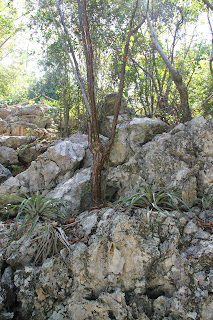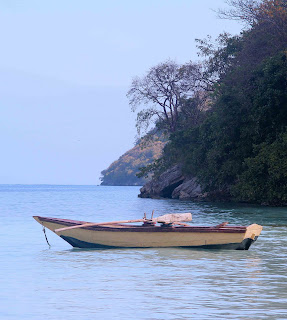care of the people in it.
Adele was always my favorite of the relatives who came to visit us in West Orange. My

mother's younger sister, she was the dashing relative who lived most of her life when I was young, as a single, independent woman with a professional career as a nurse. For a while I remember she drove a yellow Austin Healy Sprite, a convertible sports car which made her the “cool” one and she often took vacations with a woman friend to exotic locales. I envied her and looked up to her. To my young eyes, her life seemed so much more exciting than my “poor” mother who was stuck at home taking care of us. Eventually Adele supervised an entire pediatric ward in Orange Memorial Hospital.

When I was in college, she married a longtime family friend, Gene Barraro, and moved into an antique house in Connecticut. Years later, in 1997, Uncle Gene and Aunt Adele moved to Cape Cod to be near me, bringing the latest in a long line of daschunds, Oliver and Sarah, with them. We saw each other frequently, and as Gene started to fade (he was 15 years her senior) Adele and I commiserated about both being well spouses (I was still married to Mark at the time) and the problems associated with that role. I divorced in 2000 and less than a year later Uncle Gene passed away in Florida.
I have told many folks that I am not sure when her dementia/Alzheimer's began, but I know she was fine in 2001. At the time she handled everything related to Gene's death by herself—paperwork, banking, taxes everything. We spent lots of time together during the 6 months each year she was on the Cape, and she helped meet delivery men at my new house and took Janai and friends for sleepovers from time to time. She also gave me her unvarnished opinions on the guys I dated, when I was serious enough to let her meet them. Upon meeting Terry, she opined that he was a “keeper” and I shouldn't let him get away!
The dementia came on slowly, creeping like a thief, stealing her ability to make judgments first and then her ability to reason all together. She hid the early stages from me quite completely. Gradually, over time, her outspokenness became truly inappropriate comments, and stubborn refusal to change any long held habits. I found myself handling more and more of her affairs, supervising whatever she'd allow. But a legal adult is hard to control. Her last trip to Florida should never have happened; when she went missing in her car down there, I found myself dealing with friends and the local sheriffs and the credit card handlers in Pakistan to track her down. All from 1000 miles away. She was found 250 miles north trying to enter an air force base. We safely got her home, hid the car, and I flew to retrieve her from Florida.
After that it was a precipitous downward spiral. I kept her in her little house in Centerville with services brought to her there for about a year, through the death of one dog and eventually the other. When she started wandering at night, despite staffing all day, all week, we moved her to assisted living, in a locked memory care unit where she was safe. I worried frantically about orchestrating the move, but within two days she'd forgotten she'd ever lived anywhere else. Within six months, her brain started to shut off circuits to muscles, forcing her to a walker and then quickly to a wheelchair. The incapacity and incontinence went from bad to worse and the move last May to the nursing home proper went quickly. She still recognized me, but over the summer she lost my name. I could tell the face was still familiar, but by early September, she had no idea who I was. She was quiet, unable to put words together, but still smiling when I showed her pictures of family members or my dogs. I'd bring a cupcake or decorated cookie, but the visits became so incredibly painful, that I'll admit I started going less frequently—stretching it out to sometimes 10 days at a time.
Two weeks before she died the staff and I reviewed the plans for her and our decision to do nothing if she became ill except provide comfort care, nothing to prolong her life in this condition. The docs agreed and when the final cold/pneumonia set in, it didn't take long. I visited her twice in the few days right before she died and sat silently crying at her bedside as the breath rattled in her chest. I don't generally pray, since I don't really believe in a sentient being hearing prayers and responding. Those days, though, I prayed/wished just for her to go home to Uncle Gene and her beloved dogs, wherever they might be. When the phone call came in the middle of the next night, I felt only relief.
Within days, my relief took concrete form—I was released to remember who Adele really was. The agonized form in the bed blurred quickly in my memory and my mind filled with pictures of

her smiling, toothy grin, and bright mischievous eyes. I had previously, when we moved her, stashed bags of her accumulated pictures in an upstairs closet. I took them out now and began to go through them—finding not only pictures I recognized, but some of her as a young girl with my mother, their brother, Arthur and some
 with my grandparents as well. Some of these I'd never seen before. Pictures of her as a young graduate and another with her white cap and uniform smiled out at me as well.
with my grandparents as well. Some of these I'd never seen before. Pictures of her as a young graduate and another with her white cap and uniform smiled out at me as well. I don't regret any of the caregiving, any more than I regret anything else in my life. I did the right thing, the best I could do at the time. As with all of the other illnesses and disabilities in my personal circle, I quickly became the family expert on Alzheimer's and dementia. I learned about the state of scientific knowledge (or lack thereof) and what medications do what. In the early days, I learned how to orchestrate services—like finding an online service where I could program a phone call reminder to Adele in my own voice to get her to remember her nightly meds, or a tracker I could place in her car with alerts if she went out of range, and a way to find the vehicle if she got lost. Later on I got skilled at listening to my instincts when it came to both choosing caregivers and making legal and financial decisions on her behalf.
It was never easy, often exhausting, but she was family—it's what we all hope family will do for us if it becomes necessary. And because we'd had discussions, I never hesitated at the end; I knew exactly what she wanted. That was a blessing.... Adele, Gene and the dogs rest comfortable now in my memory—happily together, where they belong.







 t to waste time worrying about.
t to waste time worrying about.






















 Our first port of call was a late afternoon (far too brief) stop in old San Juan. Terry and I hiked up to El Moro through the narrow, steep, cobblestone streets, during an extremely hot afternoon. We viewed the signs of franchise civilization as an affront, though the residents proudly brag about their "Starbucks" and "Wendy's" as if they convey some kind of impressive status.
Our first port of call was a late afternoon (far too brief) stop in old San Juan. Terry and I hiked up to El Moro through the narrow, steep, cobblestone streets, during an extremely hot afternoon. We viewed the signs of franchise civilization as an affront, though the residents proudly brag about their "Starbucks" and "Wendy's" as if they convey some kind of impressive status.  We were far more impressed by the varied colors of stucco walls and the amazing mosaic tiled into stair risers hiding behind intricate wrought iron gates. Everything seemed tilted, so we gave up trying to take pictures that would look straight.
We were far more impressed by the varied colors of stucco walls and the amazing mosaic tiled into stair risers hiding behind intricate wrought iron gates. Everything seemed tilted, so we gave up trying to take pictures that would look straight.



 in the crowd.
in the crowd.




 ents swishing around. It was midday so the most interesting visitors were not in sight. Maybe tomorrow a
ents swishing around. It was midday so the most interesting visitors were not in sight. Maybe tomorrow a d, and sometimes emerged from the tall grasses to dip in the air currents swishing around. It was midday so the most interesting visitors were not in sight. Maybe tomorrow.
d, and sometimes emerged from the tall grasses to dip in the air currents swishing around. It was midday so the most interesting visitors were not in sight. Maybe tomorrow.



